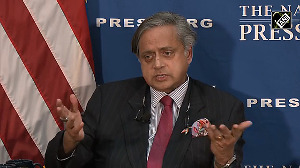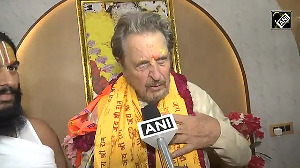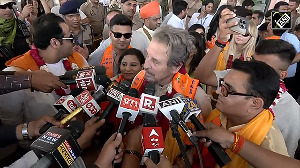 It's the season for movies with rural settings, and Moserbaer's Aval Peyar Tamilarasi (Her Name Is Tamilarasi) seems to be one of them.
It's the season for movies with rural settings, and Moserbaer's Aval Peyar Tamilarasi (Her Name Is Tamilarasi) seems to be one of them.
Directed by Meera Kadhiravan, the Tamil movie already seems to have garnered some attention on the festival circuits. With Vijay Antony scoring the music, let's see how this album, with nine tracks, has shaped up:
A warbling flute wends its way to you in the form of Nee Otha Sollu Sollu, and it takes you right back to the time when such folksy songs were the norm in the eighties and early nineties. Part of the reason is Nidha's clear voice accompanied by Ranjith. The flute takes over the instrumental sections, a blend of old fashioned folk beats and a simple tune. Ekadasi's lyrics aren't particularly scintillating, but their boredom is alleviated by the catchy melody. You've heard it before but the lilting folk tunes remain eternally pleasing. Part of their appeal is their simplicity. A charming number.
What you think might be a humdrum chorus morphs into a rather delightful Guju Gugu Goods Vandi, sung in a peppy fashion. Nancy Silvia pitches in with the chorus to Ekadasi's lyrics, and there's a happy-go-lucky feel to the song, which reminds you of all those age-old nursery rhymes of childhood. It helps, of course, that the strains are predominantly raga Sankarabaranam, the mainstay of many rhymes and that adds to the feel. The trippy pace adds to the atmosphere. Feel-good and peppy.
Vineeth Srinivasan begins the rather angsty-romantic Vadakka Thekka, and its opening lines leave you in no doubt about its intentions: heart-wrenching separation song meant to tug at your emotions. Ekadasi's lyrics are all about the missing heroine, the light of love obviously gone from the hero's life. The vocals take prominence here and instruments are pushed to the background, which is a good thing. Its simple but you can't shake off the familiar, you've-heard-it-before feel.
Palayankottai, yet another supremely folksy number begins enthusiastically and this time, Vijay Antony has taken the vocal reins to Na Muthukumar's words. Some of the notes actually sound like an S A Rajkumar song but thankfully, the instrumental arrangement moves away from it; the percussion sequence in the second segment, though brief, is appealing. Like the previous numbers, simple but familiar.
Inspired from a Marathi Lavani song, Kel Thana Rangubhai begins intriguingly, with its steady pace, percussion arrangement and Malgudi Subha's voice adding the right timbre of teasing and angst, to Eknath's lyrics. Its setting might be different from Tamil folk songs, but the real charm lies in the language itself. Having said that, the tune itself is pretty much run-of the-mill and doesn't twist your emotions as much as it's supposed to.
Ethanaiyo Katha Undu begins, like its words suggest, in a story format, rendered by Madhumitha, Mahalakshmi and chorus -- but though it might seem like a peppy song, Ekadasi's lyrics swiftly morph into something more. Conversations soon enter the song; puzzles, riddles and what nots are peppered throughout what you guess is probably something like a villuppattu setting.
Vallappakkudi Veera Sankar sings Othaiyadi Pathiyil, a complete folk song penned by Rama Thiruvudaiyan, in his rich, throaty voice. The short track is more like free verse, with its own sense of rhythm and with a refreshing lack of heavy instrumentation.
Maadathula Oli VIlakka, penned again by Rama Thiruvudaiyan and sung by Valappakkudi Veera Sankar, seems to trace the previous number but this time its sorrowful and you have to admit, it's far more effective and heart-tugging. A good deal of the appeal is the singer's voice; the words are a touching testament to loss of love and life. A simple, touching lament.
Yet another pure folk number rendered by Valappakkudi Veera Sankar, Aaraaro Aariro has been penned Ekadasi and seems like a blend of sharp anguish, love and lament all rolled into one. It also reminds you of the number Kadu Pottai Kadu, from Karuthamma. You do wonder how this song, the longest in the album might be picturised; its slow pace raises expectations. Essentially, it's almost an extension of the previous two numbers though it's a bit more repetitive than them but it's geared more towards gentle love and affection.
It looks like Vijay Antony is trying to break the mould of get-tunes-quick fixes and making genuine in-roads into a collection that tries to explore every facet of the musical spectrum. He might not have turned out a scintillating album yet, but despite a few familiar refrains, this one promises some endearing numbers.
Rediff Rating: 





